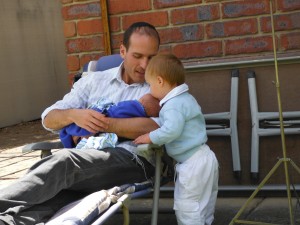Parshas Shemos: Of Births and Babies
This week while Rabbi Ben was learning, he read to me from the Talmud, that in the days of Moshiach, women will have a child every day. We don’t know about you, but a child every day seems like more than we’re quite ready to handle. For myself, having only recently given birth, the thought of doing that every day does not sound like my idea of a fun time.
How about having six at a time instead? We learn that in Egypt the Jews were “fruitful and swarmed and increased and became very, very strong.” Rashi learns out that this means the Jewish women had six babies at once.
How could this be possible? In recent years, multiple births have become more common, thanks at least in part to fertility drug usage. Still, sextuplets are a rare enough occurrence that most instances get a fair amount of media coverage. And even in twin and triplet births, the rate of birth defects and health problems are greater, so how much more so if six babies are born at once? Now imagine the women in Egypt were made to do backbreaking men’s labor, even while pregnant, and without modern medical intervention and care. How can we possibly believe Rashi?
The answer, of course, is that G-d made a miracle. When we think about the Exodus from Egypt, miracles are one of the first things that spring to mind. So this is not too far off.
And Rashi wasn’t just pulling numbers out of the air – he did calculations to figure out that there were six children per birth. The census one year after leaving Egypt states that there were 22,273 first-born males. Doubling that to account for the number of first-born females gives us 44,546 – the number of families (since there is only one first-born child per family). The census also tells us that there were 603,550 men between the ages of 20 and 60. We can double this to account for males above and below these ages, to give us 1,207,100 males. Doubling it again to account for females gives us 2,414,200 Jewish people total.
In those days, according to the Talmud, a woman needed two years after having a child before she could conceive again. Once we consider the year needed to conceive and account for gestation, there could have been only one birth every three years. A woman could have had then about 9 or 10 babies during her lifetime. Yet, when we divide 2,414,200 Jewish people by the 44,546 families the census tells us there were we end up with 54 people in each family… enough for each family to have had 6 children per birth, 9 times.
Pretty amazing, right?
We think having one baby at a time is challenging enough, let alone six, and we’re kind of hoping that having one baby per day in the times of Moshiach is allegorical (Where would they all sleep? How would you remember all their names?). I guess we will just have to wait to find out!
Shabbat Shalom!
Read more on Parshas Shemos: Moses Teaches Us Never to Get Too Comfortable
Read more on Parshas Shemos: Remember Who Your Family Is! (And the Role of Women in Judaism)






